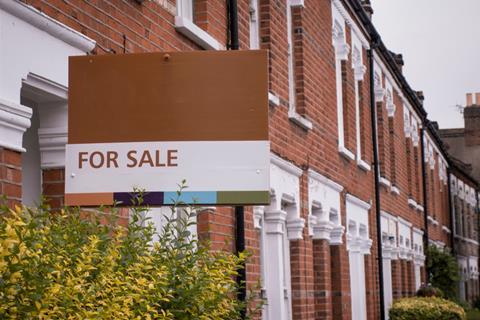Development programmes could be hit if housing market fluctations get too severe, says Savills

A new report suggests that housing associations’ development programmes could be ravaged by a slowdown in the UK housing market.
The study by Savills looked at fluctuations in the housing market and how these could ultimately hit housing associations’ ambitions to build more homes.
Highlighting falls in housing transactions and prices in key markets such as London and the South-east, Savills said that under its most severe test scenario of a reduction in funds future capacity for a housing association looking to build 5,600 homes over a 10-year period could be slashed by 3,392 homes, or 61%.
The firm said the number of unsold homes in both market sales and affordable home ownership had increased in the last three years, although as this had closely tracked the growth in completions the sector as a whole “appeared to be selling stock successfully”.
But sales programmes in London and beyond were likely to come under pressure “and the sector will need options for de-risking development programmes that are reliant on sales”.
The report said: “Switching to affordable tenures is an option that allows homes to be quickly occupied as demand is much less exposed to housing market fluctuations.
“However, this will likely require additional grant funding from the government to compensate housing associations for the loss of return on capital and to ensure they are able to continue building homes through a housing market downturn.
Savills’ report showed turnover from market sales among 192 of the country’s largest housing associations rose 16% to £1.6bn between 2017 and 2018, while growth in non-social housing activity was less than half that.
It said that first-tranche shared-ownership sales homes also carried market risk. Sector turnover from this activity increased by 10% (£110m) to £1.22bn over the same period.
The combined increase in turnover from sales and shared ownership deals was 13%, while overall turnover rose by a mere 1.8%.
The bulk of the increase in sales – 91% – came from London and the South-east, where most new homes are being built, yet the near-1% decline in average house prices in the capital was compounded by transaction numbers that were 26% down over the four-year period to 2019.
Robert Grundy, head of housing at Savills, said: “Housing associations have never been more exposed to housing market risk. What our research shows is that they need to ensure they understand the impact this increased exposure has on their business plans.
“It underlines the importance of having robust mitigation options available to cope with market fluctuations. Housing associations are well placed to flip homes for sale into affordable rented tenures but need compensating for the loss of return on capital.”
Responding to Savills’ report John Butler, finance policy leader at the National Housing Federation, said that with the government cutting almost all funding for social housing in 2010 and housing associations having to sell homes on the private market to cross-subsidise affordable housing, the desperate need for social housing meant housing associations had to innovate if they were to keep delivering in the face of a dire housing shortage.
“Of course, this does carry some risk, but housing associations are able to manage it well: they have extensive processes in place to navigate the private market and are financially regulated by an independent regulator. This is why the sector can boast a ‘no default’ record.
“However, we’ve always been clear that cross-subsidy can’t deliver enough affordable housing to meet the numbers we urgently need. This is why it’s vital that the government invests in social housing, using the upcoming spending review to make a radical change,” Butler added.
Susan Hickey, chief finance officer at Peabody, said Savills was right to argue that increased grant funding would allow housing associations to deliver far more social rented homes and mitigate sales risk.
“Public sector support will be vital in achieving our shared objectives. Peabody’s balanced development programme, focussed in London, means we are well equipped to deal with market fluctuations. We have flexibility on tenures, and remain focused on maximising the number of good quality social rented homes we provide in any event.
“Building sufficient numbers of low-cost rented housing in London is challenging, but with partners we are determined to make a big contribution,” Hickey added.
Martin Hewes of research firm Hewes Associates said the issue was simple: “There are lots of people out there who can’t afford to buy a home and housing associations are likely to face the same challenges as private housebuilders.”
Hewes said the government was now “deeply involved” in housebuilding and that thanks to schemes such as Help to Buy it was now behind 55% of public housebuilding, versus 51% in 1979.
“The difference is that in 2019 ministers don’t want to fund it,” he added.











No comments yet